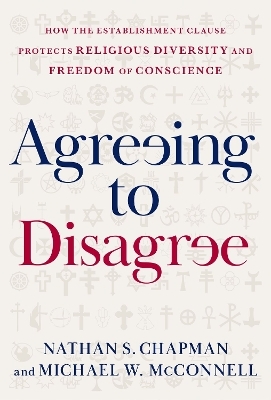
Agreeing to Disagree
Oxford University Press Inc (Verlag)
978-0-19-530466-4 (ISBN)
The Establishment Clause of the First Amendment, "Congress shall make no law respecting an establishment of religion", may be the most contentious and misunderstood provision of the entire U.S. Constitution. It lies at the heart of America's culture wars. But what, exactly, is an "establishment of religion"? And what is a law "respecting" it?
Many commentators reduce the clause to "the separation of church and state." This implies that church and state are at odds, that the public sphere must be secular, and that the Establishment Clause is in tension with the Free Exercise of Religion Clause. All of these implications misconstrue the Establishment Clause's original purpose and enduring value for a religiously pluralistic society. The clause facilitates religious diversity and guarantees equality of religious freedom by prohibiting the government from coercing or inducing citizens to change their religious beliefs and practices.
In Agreeing to Disagree, Nathan S. Chapman and Michael W. McConnell detail the theological, political, and philosophical underpinnings of the Establishment Clause, state disestablishment, and the disestablishment norms applied to the states by the Fourteenth Amendment. Americans in the early Republic were intimately acquainted with the laws used in England, the colonies, and early states to enforce religious uniformity. The Establishment Clause was understood to prohibit the government from incentivizing such uniformity. Chapman and McConnell show how the U.S. Supreme Court has largely implemented these purposes in cases addressing prayer in school, state funding of religious schools, religious symbols on public property, and limits on religious accommodations. In one of the most thorough accounts of the Establishment Clause, Chapman and McConnell argue that the clause is best understood as a constitutional commitment for Americans to agree to disagree about matters of faith.
Nathan S. Chapman is the Pope F. Brock Associate Professor of Professional Responsibility at the University f Georgia School of Law, and a McDonald Distinguished Fellow of Law and Religion at the Emory Center for Law and Religion. He was formerly the Executive Director of the Stanford Constitutional Law Center. Michael W. McConnell is the Richard and Frances Mallery Professor and Director of the Constitutional Law Center at Stanford Law School, and a Senior Fellow at the Hoover Institution. From 2002 to 2009, he served as a Circuit Judge on the United States Court of Appeals for the Tenth Circuit. He has argued sixteen cases in the United States Supreme Court, six of which involved the Religion Clauses. McConnell is also co-editor of Religion and the Constitution and Christian Perspectives on Legal Thought. His most recent book is The President Who Would Not Be King: Executive Power under the Constitution.
Introduction
Part I: History
1. Establishment at the Founding
2. Framing the First Amendment
3. Disestablishment in the States
4. Application of the Establishment Clause to the States
Part II: Modern Controversies
5. The Rise and Fall of the lemon Test
6. Accommodation of Religious Exercise
7. No-Aid Separation, Neutrality, and Religious Schools
8. Prayer, Bible Reading, and Coercion
9. Conflicts Over Symbols
10. Church Autonomy
11. Conclusion: Neutrality Beyond the Establishment Clause
| Erscheinungsdatum | 03.06.2023 |
|---|---|
| Reihe/Serie | Inalienable Rights |
| Zusatzinfo | 16 halftones |
| Verlagsort | New York |
| Sprache | englisch |
| Maße | 211 x 149 mm |
| Gewicht | 381 g |
| Themenwelt | Geschichte ► Teilgebiete der Geschichte ► Militärgeschichte |
| Recht / Steuern ► EU / Internationales Recht | |
| Recht / Steuern ► Öffentliches Recht | |
| Recht / Steuern ► Rechtsgeschichte | |
| ISBN-10 | 0-19-530466-7 / 0195304667 |
| ISBN-13 | 978-0-19-530466-4 / 9780195304664 |
| Zustand | Neuware |
| Informationen gemäß Produktsicherheitsverordnung (GPSR) | |
| Haben Sie eine Frage zum Produkt? |
aus dem Bereich


